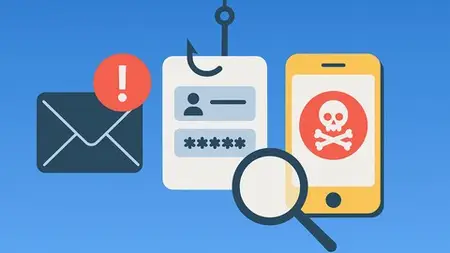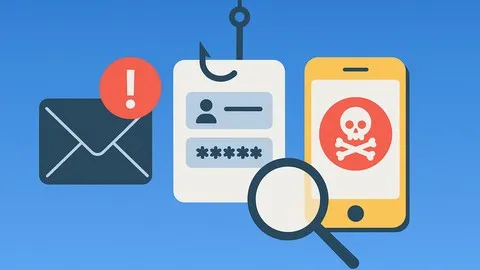Identify Spam And Phishing Emails
Published 5/2025
MP4 | Video: h264, 1920x1080 | Audio: AAC, 44.1 KHz
Language: English | Size: 506.83 MB | Duration: 1h 29m
Published 5/2025
MP4 | Video: h264, 1920x1080 | Audio: AAC, 44.1 KHz
Language: English | Size: 506.83 MB | Duration: 1h 29m
Learn to Spot, Avoid, and Respond to Phishing Threats, Including AI-Driven Attacks
What you'll learn
Recognize the typical signs of phishing and spam
Understand how generative AI makes phishing more convincing
Apply simple checks before clicking links or attachments
Use practical tools and techniques to stay safe online
Report and respond to phishing attempts confidently
Requirements
No prior cybersecurity knowledge needed—perfect for beginners
Basic familiarity with using email and online messaging
Access to a personal or work email account for hands-on practice
Willingness to learn practical safety habits and techniques
Description
Are you worried about phishing emails and spam invading your inbox? Do you want to learn how to protect yourself from online scams, especially with the rise of AI-generated phishing attacks? This course is designed for anyone who wants to build confidence in identifying and responding to digital threats.In today’s digital world, phishing has become more sophisticated than ever. Attackers are using advanced tools, like generative AI and deepfake technology, to create convincing fake emails, messages, and even phone calls. These scams often appear to come from trusted sources, making them harder to spot. This course teaches you how to recognize phishing attempts before you fall victim to them.We start by covering the basics—understanding what phishing is and how it differs from spam and scams. You’ll learn about the common features of phishing emails, including suspicious links, spoofed addresses, and emotional manipulation techniques. Real-world examples will show you how even polished, professional-looking messages can be fake.We also dive into how AI is changing the landscape of phishing. You’ll learn how attackers use generative AI to write realistic, error-free emails and clone voices to make fake phone calls sound authentic. You’ll gain insights into how social engineering techniques are becoming more sophisticated in the GenAI era.But it’s not just about awareness. You’ll also get hands-on training on how to use email filters, hover-over techniques, browser safety features, and multi-factor authentication (MFA) to enhance your online security. We’ll teach you how to report phishing attempts to your IT team or email provider and how to check your systems for compromise if you’ve clicked something suspicious.The course also emphasizes building a culture of security at work and home. You’ll learn best practices for training your team to stay alert and creating habits that make phishing harder to succeed. Whether you’re an office worker, remote employee, student, or someone just looking to boost personal safety, this course is designed for you.By the end of this course, you’ll be able to confidently identify spam and phishing emails, use practical tools to protect yourself, and respond quickly if something goes wrong. Stay safe online—learn how to spot the threats before they catch you.
Overview
Section 1: Introduction
Lecture 1 Introduction
Lecture 2 Introduction To Email Threats (1)
Lecture 3 Introduction To Email Threats (2)
Section 2: Anatomy Of A Phishing Email
Lecture 4 Anatomy Of A Phishing Email (1)
Lecture 5 Anatomy Of A Phishing Email (2)
Lecture 6 Activity: “Can You Spot The Phish?” Interactive Quiz
Section 3: GenAI And The New Face Of Phishing
Lecture 7 GenAI And The New Face Of Phishing (1)
Lecture 8 GenAI And The New Face Of Phishing (2)
Section 4: Tools And Techniques To Stay Safe
Lecture 9 Tools And Techniques To Stay Safe (1)
Lecture 10 Tools And Techniques To Stay Safe (2)
Section 5: Best Practices At Work And Home
Lecture 11 Best Practices At Work And Home (1)
Lecture 12 Best Practices At Work And Home (2)
Section 6: Quick Phishing Response Plan
Lecture 13 Quick Phishing Response Plan (1)
Lecture 14 Quick Phishing Response Plan (2)
Section 7: Conclusion
Lecture 15 Conclusion
Individuals with little or no cybersecurity background,Office workers, remote employees, and students,Anyone who checks email, texts, or DMs regularly,People concerned about AI-generated phishing threats,Those looking to improve personal and workplace email safety



